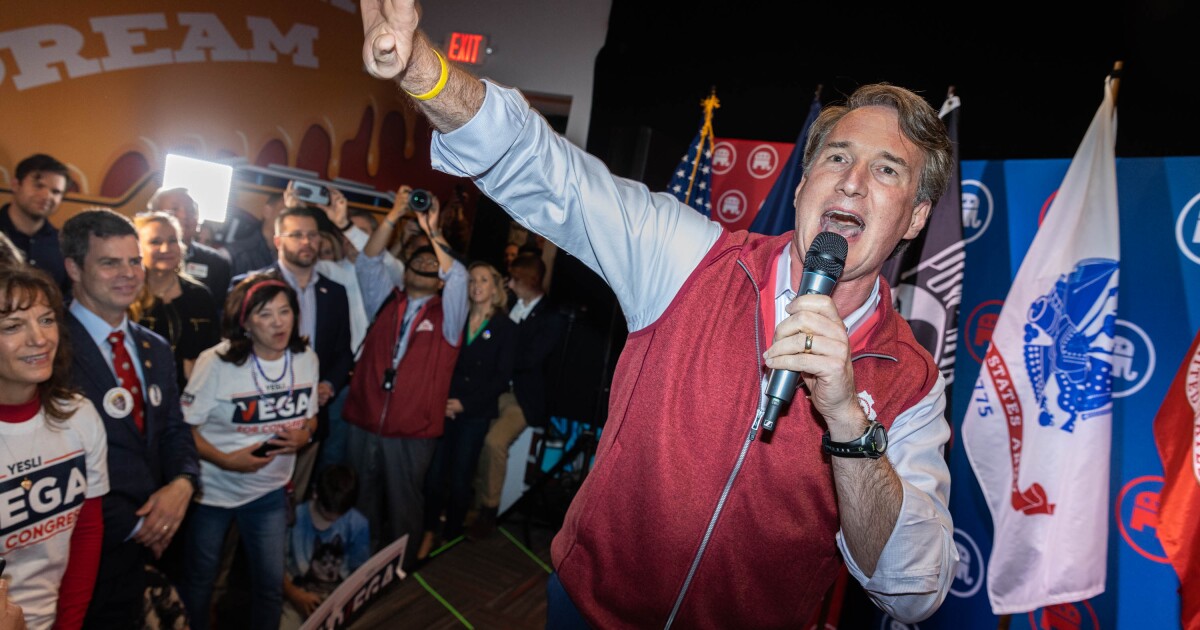

A pair of Republican gubernatorial candidates in blue states are running the playbook that vaulted GOP Gov. Glenn Youngkin to victory in blue Virginia last year.
In Oregon, Republican Christine Drazan has centered her campaign on cleaning up the twin crime and homelessness crises that have plunged Portland, the state’s largest city, into chaos.
In New York, GOP Rep. Lee Zeldin has relentlessly hammered Democratic Gov. Kathy Hochul on the issue of crime.
Both candidates have managed to sidestep politically thorny issues such as abortion and Jan. 6 by focusing the campaign conversation on a single, powerful theme that their Democratic opponents are ill-equipped to rebut.
“I think if you’re a Republican running in a normally blue state, there’s a good, sound logic to emphasizing issues that aren’t going to create a sort of standard partisan division, which would presumably leave you without a majority in the state,” David Hopkins, political science professor at Boston College, told the Washington Examiner.
“There’s a limit to how much you can convince voters to care about something they don’t already care about, so it’s not like there’s a tried and true, failsafe strategy,” he added. “But if there’s an existing concern that you can emphasize that cuts across the normal party divisions, then it makes a lot of strategic sense to try to package yourself as the solution to that concern.”
Youngkin managed to win Virginia, just one year after a Republican president lost it by 10 percentage points, in part because he turned the race into a referendum on Democrats’ approach to education. He bet his candidacy on the idea that parents remained angry over lengthy school closures, continuing mask mandates for children, and the politically charged material they found their children studying at home during the pandemic.
Terry McAuliffe, Youngkin’s Democratic opponent last year, instead ran a campaign that sought to tie Youngkin to fringe forces in the Republican Party, such as the ones that drove the Jan. 6 riots.
Critics say he failed to pay enough attention to the reasons why a focus on education was giving Youngkin such momentum in the race.
In fact, McAuliffe made a series of choices that arguably reflected how much he miscalculated voters’ frustration with the school system.
He held an election eve rally with Randi Weingarten, head of the American Federation of Teachers, a massive teachers union that fought bitterly to keep schools closed during the pandemic despite evidence that remote learning was hurting students.
And he waved off parental concerns about controversial curricula during a debate with Youngkin, infamously stating that he did not “think parents should be telling schools what they should teach.”
Like McAuliffe, Hochul delivered her Republican opponent a gift during their debate this month with a dismissive comment about the issue driving the race.
“I don’t know why that’s so important to you,” she quipped after Zeldin pressed her on the need to put more New York criminals behind bars.
The line encapsulated the essence of Hochul’s struggles on crime. By focusing on themes such as abortion and former President Donald Trump’s influence, Hochul might leave too many voters with the impression that she cares little about whether they feel safe in their neighborhoods.
That perception could cost her the race.
Perhaps spooked by poll numbers showing Zeldin eating away at her lead, Hochul has focused more directly on crime in the final weeks of the contest. Her campaign cut an ad promising New Yorkers “a safe walk home at night,” and she has touted efforts in New York City to put more police officers in the subway system.
Oregon’s Drazan has homed in on homelessness in her unusual three-way race for governor.
She has worked to tie her Democratic opponent, Tina Kotek, to the state’s unpopular Democratic governor and liberal city leaders who have allowed crime and homelessness to fester, especially in Portland.
“Kotek voted with [Oregon Democratic Gov. Kate] Brown 99% of the time,” a narrator says in Drazan’s most recent campaign ad. “Together, they gave us a homeless crisis, higher taxes, and released dangerous criminals back on our streets.”
Kotek has been forced to spend airtime defending her record on issues most voters nationally blame Democrats for mishandling.
“Nobody in Oregon would say, ‘Let’s keep doing exactly what we’ve been doing,’” Kotek says in an ad her campaign cut the final week of the election. “Certainly not me. I called for a homelessness state of emergency three years ago.”
One of the most popular incumbent GOP governors and increasingly an emblem of the party’s centrist faction, Youngkin has campaigned alongside both Zeldin and Drazan as voters prepare to render their verdicts.
Youngkin told the Washington Examiner last month that he is optimistic Drazan can win because she’s kept her attention on core issues.
“A state all of a sudden is in play that people didn’t think was going to be in play because of these kitchen-table concerns in Oregon,” he said. “It’s a homelessness crisis, and it’s crime, it’s schools, it’s expensive. And these are the same kinds of issues that we faced in Virginia.”
CLICK HERE TO READ MORE FROM THE WASHINGTON EXAMINER
Hopkins said both blue-state Republican hopefuls benefit from political winds their predecessors did not have.
“In a year that’s a midterm year, with a Democratic president, the underlying fundamentals make it a better year to be running as a Republican, period, than in 2018,” he said.
“And so, if these candidates do better than previous Republican nominees four years ago, it’s not just because they’re running a different kind of campaign,” Hopkins added. “It is just that there’s been a fundamental shift in the climate.”






